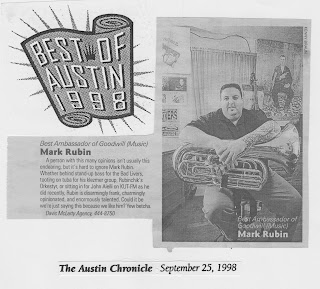Matty Karras, Longbranch Press, Longbranch NJ, 1995
As you might expect of a band that finds it appropriate to link a Johnny Cash (“Ring of Fire'') and a Motorhead song (“Jailbait”) in a medley simply because they're in the same key, the banjo-bearing, fiddle-flying, tattoo-toting Bad Livers sometimes find themselves on stage in rustic folk halls and other times in raucous punk clubs.
It's all a question of what club booked them first in any given town, according to upright bass and tuba player Mark Rubin.
“In a town like Denver, we played this little folk club the first time we played there, and from here on out we'll play that little folk club,” Rubin said.
At the Jersey Shore, on the other hand, the Livers debuted a few years back at the Fast Lane, a punk-rock cave, opening for the Butthole Surfers. Their gigs since then have all been at the Brighton Bar, the Long Branch punk haven where they will return Monday night.
“Have you ever been backstage (at a punk club)?” Rubin asked. “You know how there's graffiti all over the walls? This is the new thing we're gonna do now. We're gonna take a bucket of Lysol, we're gonna paint all the walls white and leave a potted plant. That's how punk-rock Bad Livers are."
But no matter who or what they're playing for, the Bad Livers sound and smell the same: like a banjo-and-fiddle based bluegrass band that writes sad ballads and happy banjo blitzkriegs with old-time Appalachian mountain flavors, and plays them with the virtuosity of great bluegrass musicians and the devil-may-care attitude of punk rockers. The fast songs on the band's most recent album, "Horses in the Mines,” are jumping testimonials to fingers flying on strings and blizzards of words sung lovingly through singer Danny Barnes' nose; the slow ones have a fervor that recalls gospel music.
The three Bad Livers are by now used to the sideways looks they get from new audiences, but those looks usually turn to foot-shuffling smiles once they start playing. “We're really happy about what we're playing, and I think the audience can see that," Rubin said. And now that the Austin, Texas, band has spent several years crisscrossing the country in their van, playing whatever small town would have them, he said, “We've got it down to where people know us and we don't have to explain ourselves every time”

Not that there should be that much to explain. Despite the Appalachian flavor, Rubin's basic explanation for the Livers is: We're from Texas. (Or, in his case: "I'm from Oklahoma. And everyone from Oklahoma moves to Texas as soon as they can.") In the Lone Star State, he said, “We speak a particular language, and it's the kind of environment we fit in. We're students of history and students of music. And you can devote yourself to Texas music and spend your whole life and never get tired.
"Look. We're playing the Old Settler's Bluegrass and Fiddler's Convention in Red Rock, Texas (at the end of the current tour), and once a month we're at Emo's (Austin's reigning punk-rock joint). We are the house band. You can't get more disparate than that."
The band's records and live reputation have won it some prestigious spots on its current tour - opening for Los Lobos in Detroit and for the Band at the legendary Wolf Trap in Virginia – but it has remained loyal to tiny Quarterstick Records, where its label mates include punk's veteran commercial failures the Mekons.
“In Detroit, a good quarter of the the audience was already familiar with us, and the other three-quarters was exceptionally receptive," Rubin said. “That validated a concept I've had for a long time: Our music could compete on a much higher level, on a commercial level, without changing anything."
But he said he doubts any major record label is ready to agree. There have been offers, he said, “but it's business, and in business you make someone the sucker deal right off the bat."
For now the Livers are all working part-time day jobs - Rubin is a computer systems operator for Ticketmaster (but thinks Pearl Jam is right on the mark" in its crusade against the ticket agency's high prices) — and collecting ideas for future records and side projects, such as a third Bad Livers album, due about a year from now.
"It takes time,” Rubin said, “when you've gotta go work 20 hours a week, and then you've got fishing. For every hour of work, you've gotta fish at least 20 minutes."
Rubin, the band's resident gabber, who has played bass and other rhythm instruments ever since picking up a sousaphone when a marching band coach pointed to a pile of instruments and said, "Pick up the biggest instrument you can,” hardly has to explain what he's usually after when he casts his rod.
Largemouth bass, of course.











